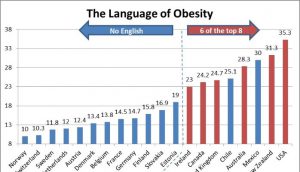 We provide wellness programming for sites across the world. A distinct challenge in doing this is that each culture is unique, with different wellness needs and wants. This fact then requires that you understand the particular issues of each wellness climate.
We provide wellness programming for sites across the world. A distinct challenge in doing this is that each culture is unique, with different wellness needs and wants. This fact then requires that you understand the particular issues of each wellness climate.
For example, Italian may be the language of romance, but English is the language of obesity.
If you line up all the countries around the world based on their obesity rates (see graphic above) you’ll see that English is the dominant language of six of the top nine most overweight countries.
These nations are located all over the globe, with different cultures, histories, and relative wealth. But what they all have in common is their language: English.
And how do we explain this odd accumulation of obesity rates clustered around the fat-free, carb-free, calorie-free factor of language?
Hypothetically, it could be that the lexicon itself drives the problem. Maybe we just have more words for it, like Eskimos have 50 words for snow. Maybe we have so many terms and phrases for “swing through the drive-thru,” “supersize that,” and “pig out” that people are encouraged to do those things, like some kind of subliminal suggestion.
But of course, English is almost certainly reflecting the problem rather than driving it. American idioms around food are not the same as those in Ireland or New Zealand. We can definitely rule this explanation out.
A second interpretation is that countries like the United States, that are more business-friendly, are less likely to regulate additive sugars and artificial ingredients in food products. Choking grocery shelves with these unhealthy products might contribute to higher obesity rates, particularly among our children.
However, Ireland and England are both on the list, and these countries are in vastly more socialized political and economic systems. Scratch that explanation off the list.
A third thought is that there’s an educational gradient to obesity: more education is associated with less obesity. Although there’s some support for this idea within the U.S. anyway, it’s hard to say that this entire list of English-speaking countries is all less committed to education than the other thinner countries.
Socioeconomics also falls short. There is some idea that those with less money have a harder time finding good food. However, the U.S. has one of the highest standards of living in the world.
So much for all that.
So What Makes English the Language of Obesity?
It may all come down to the fact that the most obese country of all English-speaking countries—the United States—also has the biggest voice in the world. It’s like having someone with an oversize influence, who gets seen more and thus emulated more.
The same could be said across those countries that speak English, as the American image, mystique, and visibility can influence the cultural norms. One culture influencing another would be fine if it were only that the people in other countries were just wearing bluejeans, incorporating blues music, utilizing social media technology, and so.
But we have other cultural behaviors that contribute to the highest obesity rates on Earth. When those activities become incorporated right along with T-shirts, Elvis, and Facebook, language becomes the vector of that transmission. So English does not cause the effect you see, but it acts like a facilitator.
It’s the window through which the fume of our unhealthy habits escape to the world. It’s the convenient access point for all who speak it. And the outsize influence of American allure is what moves dietary norms in our direction rather than theirs.
In other words: the more other countries look to us, the more they look like us.
If you live in one of these other countries, remember the cultural habits you had when you were thinner and healthier: fewer processed food products, drive-thrus, and habits like eating on the run. Reincorporate more traditional habits before adopting the eating norms of a country in which two-thirds of the people are overweight, obese, and morbidly obese.



